
Samsung Galaxy Stardust (2015)
The manufacturer offers this phone with a 4 inch TFT display, a Qualcomm Snapdragon 200 MSM8210 SoC, and 1 GB of RAM.
Does this phone justify its price tag? I hope to provide clarity by the conclusion of my review.
Table of Contents
- Samsung Galaxy Stardust specifications
- Weight, dimensions, colors
- System, chipset, performance
- Display type, size, resolution
- Memory, storage
- Cameras, flash
- Connectivity, network, wireless
- Battery type, capacity, charger
- Features, sensors, specials
- Verdict, pros and cons
This article shares our personal experiences and thoughts about using the Samsung Galaxy Stardust smartphone. We hope to offer helpful insights to others interested in this device.
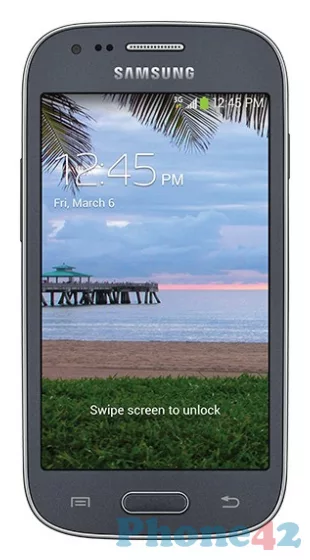
Samsung Galaxy Stardust specifications
| Brand | Samsung |
|---|---|
| Name | Galaxy Stardust |
| Model | SM-S766 |
| Release date | 2015 |
Weight, dimensions, colors
| Weight | 4.34 oz |
|---|---|
| Dimensions | 4.76 x 2.48 x 0.39 inch |
| Colors | gray |
| SIM type | Mini SIM |
The weight of Samsung Galaxy Stardust is about 4.34 oz with battery. This is average for smartphones of the same size.
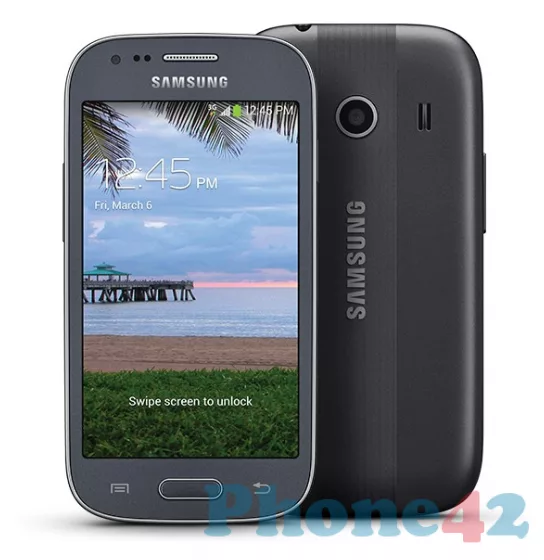
System, chipset, performance
| OS version | Android OS v4.3 (Jelly Bean) |
|---|---|
| SoC | Qualcomm Snapdragon 200 MSM8210 |
| CPU | Dual-core 1.2 GHz Cortex-A7 |
| GPU | Adreno 302 |
The Samsung Galaxy Stardust comes with Android OS v4.3 (Jelly Bean) out of the box. Google has integrated many services with Android. These include Google Maps, Gmail, and Google Drive. This Qualcomm Snapdragon 200 MSM8210 CPU can be fast enough for basic phone operations. Qualcomm's Snapdragon processors work with Adreno GPUs. The processors are designed for the GPUs.
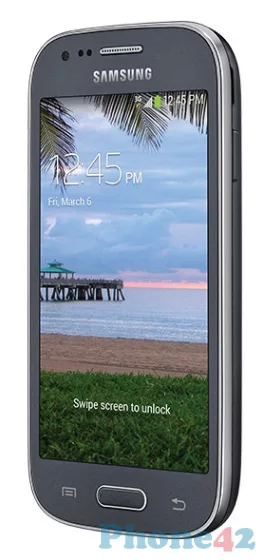
Display type, size, resolution
| Display type | TFT |
|---|---|
| Screen size | 4 inch |
| Resolution | 480 x 800 px |
| Multitouch support | yes |
The 4 inch phone comes with TFT display. A thin-film transistor (TFT) features a thin-film transistor for each individual pixel. Smaller smartphones are generally more compact and easier to handle. The size of the screen is measured diagonally, from corner to corner.
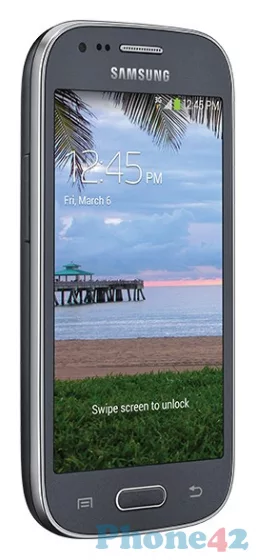
Memory, storage
| RAM | 1 GB |
|---|---|
| Internal storage | 8 GB |
| Memory card slot | microSD |
1 GB of RAM is not typically considered to be enough for a smartphone. Having more RAM alone does not guarantee better performance. Most people think a smartphone needs at least 32 GB of storage. The Galaxy Stardust has only 8 GB. We can expand the internal storage (8 GB) with a compatible microSD card.
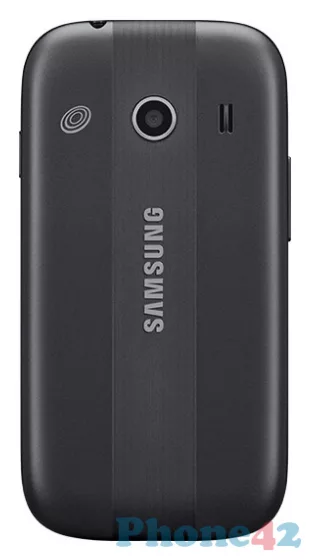
Cameras, flash
| Main camera | 5 MP, 2592 х 1944 px |
|---|---|
| Flash | no |
| Selfie camera | VGA |
This single camera can be enough for many smartphone users, it depends on their photography needs and preferences. The Galaxy Stardust does not have optical image stabilization (OIS).

Connectivity, network, wireless
| GSM 2G bands | 850 / 900 / 1800 / 1900 |
|---|---|
| Network coverage | 2G / 3G |
| Wi-Fi | Wi-Fi 802.11 b/g/n |
| Bluetooth | v4.0, A2DP |
| GPS | A-GPS |
| NFC | no |
| FM radio | no |
| USB | microUSB 2.0 |
| Headphone | 3.5 mm jack |
The 3G is obsolete now, because most phones can use 4G and 5G networks. This phone like all modern smartphones, is capable of connecting to Wi-Fi networks. The Galaxy Stardust smartphone is capable of connecting to Bluetooth devices. This phone has a built-in GPS. The phone isn't NFC (Near Field Communication) capable. NFC is not essential for basic phone functionality, but it can be useful. The 3.5 mm headphone jack allows us to connect wired headphones or earphones to the device.

Battery type, capacity, charger
| Type | Li-Ion 1500 mAh |
|---|
The Li-Ion 1500 mAh battery gives the smartphone a good battery backup. The Li-ion is a low maintenance battery. It does not need periodic full discharge. We can simply buy a new battery from the open market and interchange it by ourselves.
Features, sensors, specials
| Sensors | accelerometer |
|---|
Today, smartphones come with many sensors. They help make the user experience better. The accelerometer provides information about the smartphone's movement in three axes. These are X (horizontal), Y (vertical), and Z (depth).
Verdict, pros and cons
Every phone has its strengths and weaknesses, and this Samsung phone is no exception. As with any device, there are aspects that shine and others that fall short. By examining both sides, we can paint a complete picture of what this phone has to offer. Let's explore its standout features and areas for improvement. Remember, this is just my opinion, and yours might be different.
Pros
- microSD slot
Cons
- TFT display
- limited-size screen
- insufficient memory
- insufficient internal storage
- single camera setup
- no OIS function
- lack of autofocus
- no 4G support
- no 5G support
- no NFC feature
- no Type-C USB port
- low-capacity battery
- no digital compass
- no fingerprint reader
Please let us know if you find incorrect information or something isn't working. Also, tell us if you have a suggestion for improvement.
Updated: June 7, 2024
 I'm Lucas Bradley, the founder of the Phone42.com site. I love technology, especially smartphones, and I've been working with tech stuff for more than 20 years. This means I've seen a lot of changes and have learned a bunch about what makes a good phone. On Phone42.com, I look at all kinds of phones. They can be from big, well-known companies or new ones trying to make their mark. I want to help people understand what's new and cool in the world of smartphones, in a way that's easy to get.
I'm Lucas Bradley, the founder of the Phone42.com site. I love technology, especially smartphones, and I've been working with tech stuff for more than 20 years. This means I've seen a lot of changes and have learned a bunch about what makes a good phone. On Phone42.com, I look at all kinds of phones. They can be from big, well-known companies or new ones trying to make their mark. I want to help people understand what's new and cool in the world of smartphones, in a way that's easy to get.